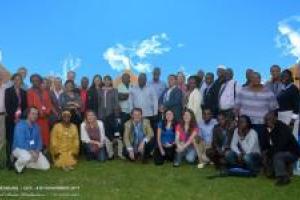The African School of Forensic Sciences and Human Rights was organized by the Argentine Forensic Anthropology Team (EAAF) with support from the Embassy of Argentina in South Africa, the Foundation for Human Rights in South Africa, and the South African organization Street Law .
The objectives of the School are:
- Train forensic specialists from African countries in the implementation of various forensic disciplines for documentation and investigation of human rights violations in their home countries
- Incorporate the issues relating to the defense of Human Rights in forensic work
- To promote a holistic approach in assisting victims of human rights violations and their families, taking into account the values and beliefs of each social group
BACKGROUND
With the exception of South Africa, few countries in the continent have developed an effective and independent forensic system. Also, the lack of local developments in various academic fields, such as anthropology or genetics - causes and forensic specialists are forced to work without the support of experts in other disciplines.
This situation is particularly worrying because the forensic work in a forensic investigation often conflicts with the beliefs and practices of local people, especially in regard to the treatment of the bodies, adding to the difficulties faced by coroners.
For forensic investigations constitute a successful process is of great importance to link forensic experts with the families of the victims and organizations defending human rights. The latter are often the first to collect testimonies of survivors and witnesses in cases that forensic experts will investigate later. The relationship between the families of the victims and the officials and forensic experts is typically tense. Government agencies are often perceived as perpetrators or accomplices in covering up crimes under investigation. Often families are abused by staff or sometimes even denied the fact of disappearances and other violations related to their family. Therefore, the coordination of experts in different branches facilitates the research process.
In this regard, the Argentina experience in identifying the remains of missing persons in the country during the last military dictatorship, a valuable tool that can contribute to capacity building in Africa becomes.
EAAF working in Africa on issues related to the investigation of violations of Human Rights and the education and training of forensic experts, lawyers, prosecutors and NGO s since 1994.
FIRST YEAR OF AFRICAN SCHOOL OF FORENSIC SCIENCE AND HUMAN RIGHTS
The First Year of the African School of Forensic Science and Human Rights began on November 5, 2012 at the Department of Clinical Anatomy, University of Kwa -Zulu Natal.
School began on November 5, with the assistance of 13 forensic specialists from South Africa, Botswana, Burundi, Nigeria, Uganda, Kenya, Sudan and Ghana.
Classes were offered in the Department of Clinical Anatomy, University of Kwa Zulu Natal, Durban, and teachers were experts from Argentina, Denmark, United States and South Africa.
The topics included:
- Human Rights, international and regional system; conventions, mechanisms of the United Nations and African Truth Commissions, the Right to the Truth, among others.
- Relationships with family members of victims, ante mortem data recovery, databases.
- Exhumation of bodies
- Anthropological and genetic analysis
- Establishment of genetic databases
- Analysis of victims of torture and death in custody, international protocols
- Location of the forensic system in African countries
SECOND YEAR OF AFRICAN SCHOOL OF FORENSIC SCIENCE AND HUMAN RIGHTS
The second year of the African School of Forensic Science and Human Rights began on November 11, 2013. This time the course was held in Johannesburg in units of the Faculty of Medical Sciences at the University of Witwatersrand and had the support of the Embassy of Argentina in South Africa and the Foundation for Human Rights in South Africa.
The course was attended by 14 professionals who were awarded grants by the organizers and representing ten African countries: Benin, Ghana, Kenya, Libya, Nigeria, Senegal, South Africa, Togo , Uganda and Zimbabwe.
The faculty was composed of professionals from the EAAF ( Luis Fondebrider Claudia Bisso ; Ivana Wolff ; Mercedes Salado Puerto ; Mariana Segura ) , the Argentine lawyer Ignacio Tredicci and international experts such as forensic anthropologists Steve Symes USA, Henriette Stratmann Holland , Maria Dolores Morcillo of Colombia and Patrick Randolph - Quinney South Africa.
Related links:


